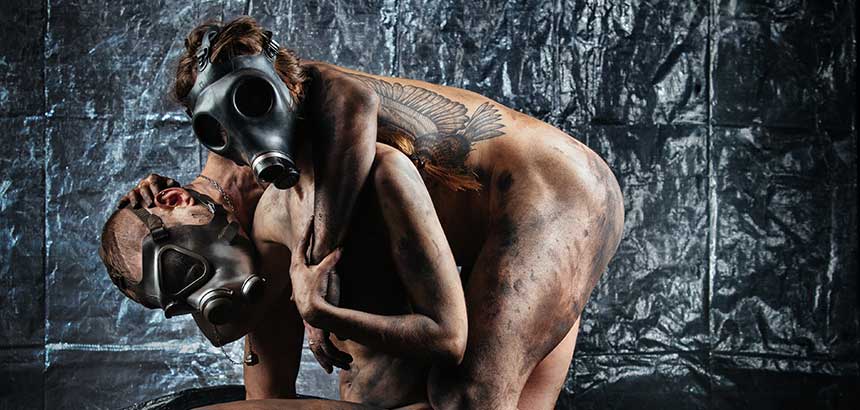a conversation between Susanna Fournier and Sina Gilani
War is a space that allows for male intimacy.
But is that the only place that male intimacy can be achieved?
I hope not.
When I think of my Persian heritage for example, I find the culture very homoerotic. Maybe not in the domestic sphere, but socially for sure.
For me, growing up in a culture defined by a white, Anglo-Saxon, Protestant worldview, war narratives were the only stories in which I saw men care for and protect one another. The language of “brotherhood” always seemed to be connected to enduring violence together, surviving hard labour.
That is so interesting. In Iran (and, to my knowledge, in many Islamic countries) we call each other brothers as a term of endearment; it’s like our version of “dude.”
I always observed “brotherhood” as something a man had to earn. I wonder if war became a place of male initiation – surviving war meant you had earned your masculinity.
It’s very Spartan if you ask me – hero narratives. It’s the rite to become an individual in that way, no?
War epics and poems are a significant part of how I arrive at my sense of self, culturally. For God, king, and country, as they say.
Yes, and these are symbols of the Father, no? War is attached to a deep sense of the masculine. Millions of young men are sent to serve this Father symbol, to fight for him. I wonder how this deep longing for masculinity has been harnessed by power – I’m thinking of imperial power. “Country” is a relatively new word for empire.
Yes, but now we also have women serving in the army, and others.
Absolutely. Yet we still see modern armies as an incredibly “male” sphere – with a very narrow understanding of what is “male.” Women soldiers and queer soldiers are marginalized, often violently abused.
That is what I’m trying to get at by connecting masculinity and individuality. The Eurocentric-Western notion of arriving at a sense of self is violent. You know – I don’t know how to say it – but the self is aggressive. “I,” it is separate from the rest; it needs an other to dominate to assert itself.
We are a fiercely individualistic culture. Modernity has created a space where the “I” has replaced a sense of collectivity, or sense of God. Capitalism is fuelled by exploitation, so the pursuit of individual power is, within capitalism, a violent pursuit.
YES. The self is a consumer.
And the self is a “soldier” within this system. The self must attain power (through wealth) or else have power extracted from oneself.
That is why I think modern warfare is an expression of capitalistic aesthetics and individualism.
And much of war is played out through economics these days: violent takeovers of countries and communities are done through neoliberal trade negotiations. A country and culture can be destroyed without troops ever setting foot on the land.
And a “good” war is no longer about the story of it. I mean, Syria is all over the news, but I can’t name a hero, like an Achilles versus Hector or a Rustam versus Isphandyar. Capitalistic aesthetics do define a new “good war,” don’t they? A war no longer about heroes, but a war that is cost effective, profitable. But then what happens to the individual, the soldier?
They become a tool of labour, like in any other industry.
But one without a good story. What is there for them? Glory? A medal? A pension? Is a gender-fluid Penelope eternally waiting for their return?
We’re actually seeing an increasing rise in veteran suicides. They participate and survive brutality only to “return” to a life that cannot comprehend or support what they have endured. What is this initial act of colonization that must occur in the creation of “soldiers”? In order to dehumanize others, to kill on command, what part of the self must first be dehumanized?
Dehumanized? That word is interesting.
Yes, considering war has been a part of human activity since the beginning, what is this violent part of ourselves we want to believe isn’t a part of “humanity”? Especially in a culture where power feels good. We all want to be near “the king.” It’s attractive.
It is also safe. “King” gives the illusion of control. “Phallic” is a time-tested symbol of dominance over chaos.
Which is, in a sense, to dominate and control the Feminine – the realms of chaos, life, and creation.
Is every war a war against the Feminine? Is every war actually being waged against death, in an attempt to control it?
I really think it is: we offer the best of us! For death to claim, or we used to. Modern warfare – I’ve seen it – there’s very little agency involved.
So, in an attempt to dominate chaos, we create it?
Yeah, we manufacture chaos, and we create it.
War was once an expression of violence connected to life and death.
And what I wonder, perhaps what this play wonders, is how this expression, this longing, has been harnessed, as a narrative, to serve imperial power.
Great.
photo by Tanja-Tiziana


